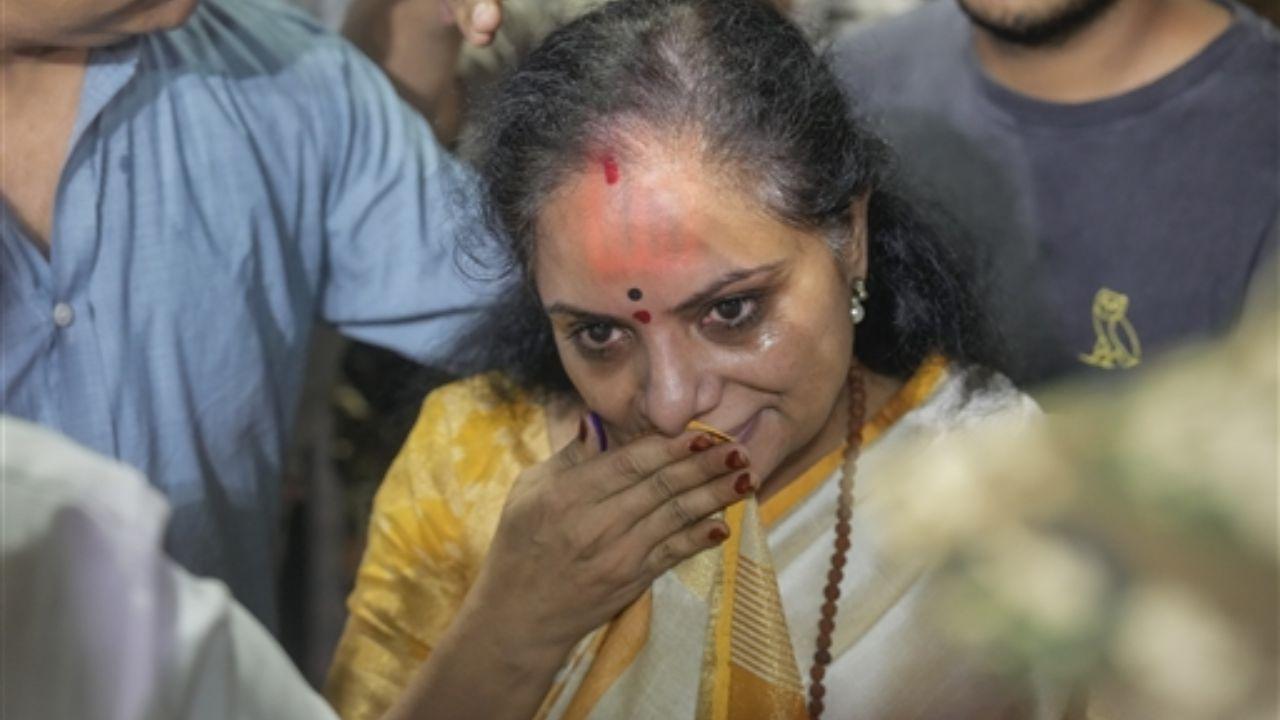Supreme Court emphasised that the fundamental right to liberty is "superior" to the constraints imposed by anti-money laundering legislation.

BRS leader K Kavitha was released from Tihar Jail on August 27, 2024/ PTI
The Supreme Court of India granted bail to BRS leader K Kavitha in connection with the Delhi excise policy "scam" cases, underlining that lengthy imprisonment without a conviction is equivalent to "punishment without trial." The court emphasised that the fundamental right to liberty is "superior" to the constraints imposed by anti-money laundering legislation, reported PTI.
Kavitha, 46, had been detained after being arrested by the Enforcement Directorate (ED) on March 15, 2024, in a money laundering case. On April 11, 2024, the Central Bureau of Investigation (CBI) arrested her in connection with a corruption investigation.
According to the report, on Tuesday, a bench of Justices BR Gavai and KV Viswanathan granted her bail, raising concerns about the fairness of the central investigating agencies' conduct, notably their approach to identifying accused individuals.
In a 13-page decision, Justice Gavai restated the long-standing legal tenet that "bail is the rule and refusal is the exception." Referring to previous decisions, including that of Manish Sisodia, a former Delhi deputy chief minister and co-accused, the court ruled, "The prolonged incarceration before being pronounced guilty of an offence should not be permitted to become punishment without trial."
"We had further observed that the fundamental right of liberty provided under Article 21 of the Constitution is superior to the statutory restrictions (of the Prevention of Money Laundering Act)," the judgement said per PTI report.
The court stated that the CBI and ED investigations were concluded and that Kavitha's ongoing custody was unnecessary. The bench also faulted the Delhi High Court's previous decision to deny Kavitha bail under Section 45(1) of the PMLA, which grants women preferential treatment, the news agency report read.
The Supreme Court noted that the High Court misread this section, concluding that it only applied to "vulnerable women".
Proviso to Section 45(1) of the PMLA states, "Provided that a person, who, is under the age of sixteen years, or is a woman or is sick or infirm, or is accused either on his own or along with other co-accused of money-laundering a sum of less than one crore rupees, may be released on bail, if the special court so directs".
The court, in their judgement per PTI report, stated, "A perusal of the...proviso would thus reveal that the proviso permits certain category of accused including women to be released on bail, without the twin requirement under Section 45 of the PMLA to be satisfied ...However, when a statute specifically provides a special treatment for a certain category of accused, while denying such a benefit, the court will be required to give specific reasons as to why such a benefit is to be denied."
Justice Gavai, further noted, "The learned Single Judge thereafter proceeds to observe that the present appellant cannot be equated to a 'vulnerable woman'...We find that the learned Single Judge erroneously observed that the proviso to Section 45(1) of the PMLA is applicable only to a 'vulnerable woman'."
The verdict added, "We, therefore, find that the learned Single Judge of the High Court has totally misdirected herself while denying the benefit of the proviso to Section 45(1) of the PMLA."
Kavitha, the daughter of former Telangana Chief Minister K Chandrashekar Rao, has been accused of belonging to the "South Group," a cartel that allegedly paid Rs 100 crore in kickbacks to Delhi's ruling AAP in exchange for liquor licenses. She has refuted all claims. The Supreme Court ordered her release on bail with restrictions, including the surrender of her passport and a Rs 10 lakh bond in each case. The judge also ordered her to cooperate during the trial and refrain from tampering with evidence or influencing witnesses, the PTI report stated.
 Subscribe today by clicking the link and stay updated with the latest news!" Click here!
Subscribe today by clicking the link and stay updated with the latest news!" Click here!










